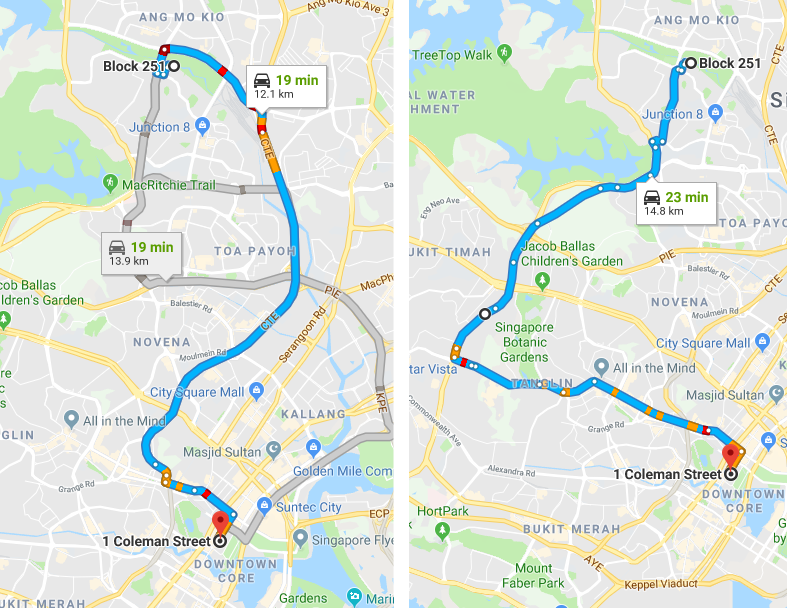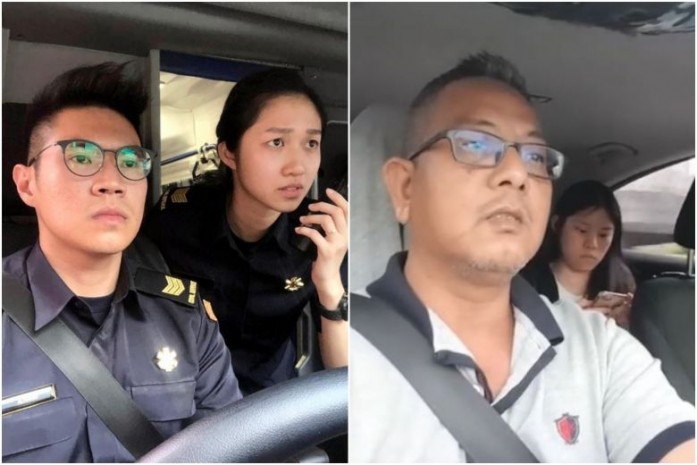“You took me hostage!” “Is it because I am Chinese?”. Most Singaporeans would by now be able to identify these phrases from a heated exchange of words between a Gojek driver, Mr Kamaruzzaman Abdul Latiff and his unhappy passenger, Ms Jovina Choi, after a video released by Mr Kamaruzzaman went viral online.
The clip appeared to suggest that the root of the argument was that the female passenger was upset with the driver for not avoiding the Electronic Road Pricing (ERP) gantries during the journey. The journey was from Block 251 Bishan Street 22 to 1 Coleman Street at around 0710 hrs. It was unclear if the passenger’s request was to avoid the ERP gantries within the Central Business District (CBD) area or all ERP gantries. If the latter, that would neither be reasonable or possible. However, if her preference was to avoid the Central Expressway (CTE) gantries, the driver could have detoured along Farrer Road.

Right: Possible alternative route to avoid ERP charges along the CTE.
There are many meme circulating on the internet. Even Singapore’s SCDF is taking a go at it.

Credit: Facebook/SCDF
But on a serious note. There are serious accusations and implications by the actions of both the driver and passenger.
Firstly, the passenger made the allegation that “it is clear you are out to cheat money”. I assumed she meant the extra ERP charges levied in addition to her fare. But since ERP charges are a pass-through levy, I cannot see how incurring additional/any ERP charges would benefit the driver.
Secondly, the passenger shouted frantically
“he lock the door, he lock the door. Unlock the door now, he is taking hostage of me”. Even if the car has an auto-lock mechanism, the passenger could easily unlock the back seat door. Accusing someone of taking another person hostage is a serious allegation.
Lastly, the passenger played the race card, “is it because I am Chinese?”. Could this be a reflection of how fragmented our society is when it comes to different races? As a nation, do we need to do more to ensure trust and racial harmony?
Taxis and private-hire cars can have inward-facing video cameras from June 22 2018. There are strictly guidelines imposed by the Land Transport Authority (LTA). Inward-facing video cameras installations only be done at LTA-authorised centres.
The National Taxi Association did lobby for audio recording to be allowed, as it would be helpful in cases of verbal disputes between drivers and passengers. However, the current regulation prohibits audio recordings to ensure the privacy of passengers.
Current regulation also specify that the cameras have to be secured, and the data contained cannot be downloaded or accessed without authorisation – such as by locking the memory card slot. Video footage can also only be retained for a maximum of seven days.
Whilst it can be argued that in this instance, without audio recording it would have been difficult to verify the accuser/victim’s version of their altercation. But as the law stands, it is likely that Mr Kamaruzzaman’s actions have fallen foul of regulations as he not only had a recording device but shared the video clip publicly without authorisation.
I hope the authorities will take heed of this incident and make appropriate changes to the law to better protect both passengers and drivers. I support the idea that audio recording should be permitted (with prior notice to the passenger) but all video recordings (by all parties) should only be released to the appropriate authority such as the police or LTA.
